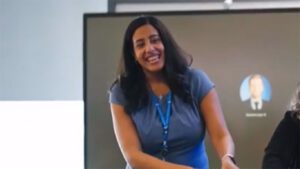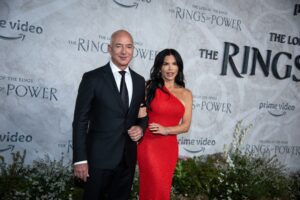Nadine Fahim is a senior innovation and technology executive based in Clearwater, Florida. She currently serves as the Global Innovation & Emerging Technology Leader at KPMG, where she leads global initiatives focused on product development, emerging technology, and innovation strategy.
With over two decades of experience, Nadine has built a career helping teams transform ideas into working solutions. She has worked across global markets, leading cross-functional teams and managing co-innovation efforts with clients, alliances, students, and startups. Nadine Fahim‘s leadership extends across Asia, Europe, North America, and the Middle East.
A lifelong learner, Nadine holds degrees in Systems Analysis and Engineering Management, along with certifications in AI, product management, and design thinking. Her capstone project on AI and ideation was fully funded by KPMG and deployed globally. She is also the co-inventor of a patent-pending AI-powered incubation management system.
Nadine is equally active outside the corporate world. She serves on the board of Haven International, a non-profit aiding survivors of human trafficking, and on the board of the Hillsborough Community College Foundation. Her approach to leadership blends practical innovation with a strong commitment to purpose-driven work.
From designing global incubators to supporting local outreach, Nadine brings clarity, structure, and vision to everything she does. Her focus remains on helping people unlock their potential—through technology, teamwork, and service.
Q&A: Navigating Global Innovation with Nadine Fahim
Nadine, your role at KPMG places you at the center of global innovation. How did you come into this space?
I’ve always been curious about how things work. Even as a child, I was constantly asking, “What if we did it this way?” That mindset carried into my academic path—first in Systems Analysis, then a masters in Engineering Management. Over time, that curiosity evolved into a passion for helping others bring new ideas to life, especially in complex, global environments.
I started my career in innovation at a top 3 bank where I led their Enterprise Idea Program—an effort to tap into employee ideas and turn them into tangible business outcomes. While I loved the work, I wanted to see more of the world and take on broader challenges. That led me to KPMG, where I was recruited into Advisory to lead innovation engagements for clients across industries. Eventually, I was asked to transition internally to build and lead the first innovation program for the U.S. firm.
The success of that program, especially the ability to drive measurable impact and cultural change, led to an opportunity to serve as the Global Innovation Leader. In this role, I now have the privilege of helping teams across more than 140 countries unlock their innovation potential.
What does your current role involve?
At KPMG, I lead our global strategy for innovation and emerging technologies. That includes setting up innovation frameworks, incubating new offerings, building ecosystems that bring clients and alliances together to co-create the future, and helping teams across continents take ideas from concept to solution. I also help build tools—like our AI-powered incubation platform—that support these processes at scale.
You mentioned the AI incubation platform. Can you tell us more?
It started as a capstone project during my executive education at UC Irvine. The idea was to create a system that could help connect innovation data and early-stage ideas across geographies and client engagement teams. KPMG funded it and it’s now in use globally. Our next phase is to make it agentic. I also co-invented a related patent, which is currently pending. It’s exciting because it’s not just about the tech—it’s about enabling people to act on their ideas and drive value with real structure and support.
You’ve led efforts across different regions. How do you handle that complexity?
Each country and culture brings its own context. Whether I’m working with teams in India, Germany, or the U.S., I focus on building mutual understanding and clear communication. Innovation only works when trust is in place, especially in cross-border collaborations. It is also very intriguing to see emerging technology hype cycles traveling across continents and cultures, like a wave, as people embrace and adopt the latest technologies.
How do you approach co-innovation?
It’s about creating shared ownership in achieving a common, mutually beneficial goal. Whether it’s students, clients, or internal teams, I try to build environments where everyone feels safe to contribute and experiment. We’ve run pitch competitions, hackathons, and startup partnerships—all aimed at surfacing new solutions through collective effort.
What technical skills help you stay close to the work?
While I often lead innovation strategy, I intentionally stay hands-on with emerging technologies to stay grounded in what’s actually possible. I actively experiment with AI platforms like GPT models, Gemini, Azure AI, and Microsoft Copilot to streamline processes and explore new business use cases. I also use low-code and workflow automation tools like n8n and Workbench to quickly connect systems and test scalable solutions. For design and user experience, I use tools like Figma to visualize and rapidly prototype concepts. Outside of work, I enjoy working with hardware like 3D printers and laser cutters, which adds another layer of perspective when thinking about physical-digital experiences. Staying close to the tools not only keeps me current but also helps me better connect strategy to execution and collaborate more meaningfully with technical teams.
You’re also deeply involved in the nonprofit world. Can you talk about that?
Definitely. I serve as Vice President of Haven International, where we’re working to raise $1 million to build a safe home for survivors of human trafficking. I also Chair the Development Committee on the Hillsborough College Foundation board to steward philanthropic support for the success of our students. I think leaders have a duty to use their skills and networks to serve others. That’s always been a core part of who I am.
With so much on your plate, what keeps you grounded?
Faith, my loving husband and family, and service. I also love creating—whether that’s in a strategy session or building something in a workshop. The act of making something useful keeps me focused.
What advice would you give someone entering your field?
Stay curious, stay adaptable, and remember it’s never about the technology alone—it’s about what it enables and the problems it solves. Your job is to help others succeed by giving them the tools, structure, and support to do so.






